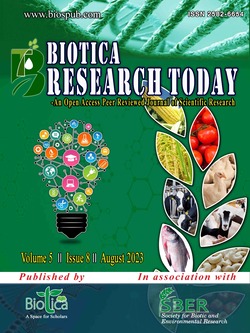
Effective Integrated Management Strategies for Chilli Thrips (Scirtothrips dorsalis Hood) in Chilli Crops
Kartikey Singh
Dept. of Entomology, Chandra Shekhar Azad University of Agriculture & Technology, Kanpur, Uttar Pradesh (208 002), India
Nahida Afreen
Dept. of Entomology, Chandra Shekhar Azad University of Agriculture & Technology, Kanpur, Uttar Pradesh (208 002), India
Prince Sahu*
Dept. of Entomology, Chandra Shekhar Azad University of Agriculture & Technology, Kanpur, Uttar Pradesh (208 002), India
Aman Pratap Singh
Dept. of Entomology, Acharya Narendra Deva University of Agriculture & Technology, Ayodhya, Uttar Pradesh (224 229), India
Rajat Singh
Dept. of Vegetable Science, Chandra Shekhar Azad University of Agriculture & Technology, Kanpur, Uttar Pradesh (208 002), India
DOI: NIL
Keywords: Chilli thrips, Economic threshold level, Integrative strategies, Notorious pest
Abstract
The chilli thrips, also known as Scirtothrips dorsalis Hood, is a highly devastating sucking pest that poses a major threat to vegetable, ornamental and fruit crops. Among these, the chilli crop suffers the most, making it the primary target of this pest. Originating from South-East Asia, the chilli thrips are also referred to as yellow tea thrips and strawberry thrips. To effectively manage this notorious pest, close monitoring of its population is essential, with an Economic Threshold Level (ETL) set at two thrips leaf-1. Both juvenile phase (nymph) and mature chili thrips result in heavy economic loss, leading to leaf curling and scarring on chilli fruits. In this literature, the focus is on promoting bio-friendly tactics and encouraging farmers to adopt secure operational strategies. Diverse integrative techniques are discussed to manage chilli thrips, aiming for sustainable and eco-conscious practices to protect chilli crops while minimizing harmful chemical usage.
Downloads
not found
Reference
Kulshreshtha, K., 2011. Wonders of a Veggie Diet! Science Reporter 48(10), 45-52. URL: http://nopr.niscpr.res.in/handle/123456789/12879.
Padaliya, S.R., Thumar, R.K., Pipaliya, G.K., Bhagora, J.K., 2018. Bio-efficacy of different botanicals against Thrips, Scirtothrips dorsalis Hood infesting Bt cotton. International Journal of Current Microbiology and Applied Sciences 7(7), 2893-2903. DOI: https://doi.org/10.20546/ijcmas.2018.707.339.
Sanjta, S., Sanjta, U., Mehta, P.K., 2018. Thrips and their natural enemies in different ornamental plants of Himachal Pradesh. Journal of Biological Control 32(1), 20-24. DOI: https://doi.org/10.18311/jbc/2018/17883.
Seal, D.R., Klassen, W., Kumar, V., 2010. Biological parameters of Scirtothrips dorsalis (Thysanoptera: Thripidae) on selected hosts. Environmental Entomology 39(5), 1389-1398. DOI: https://doi.org/10.1603/EN09236.
